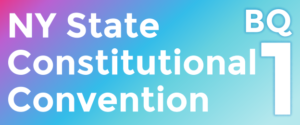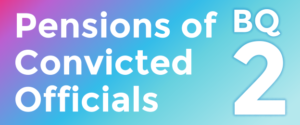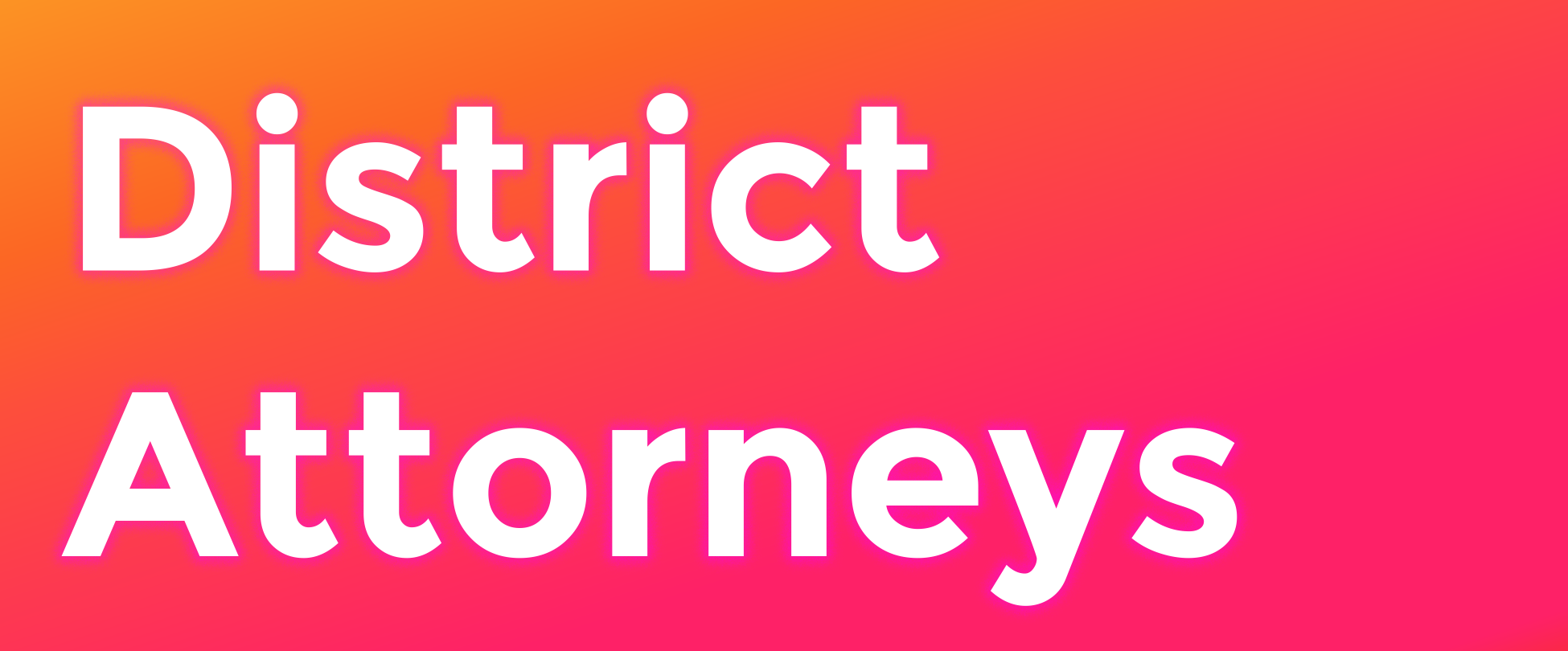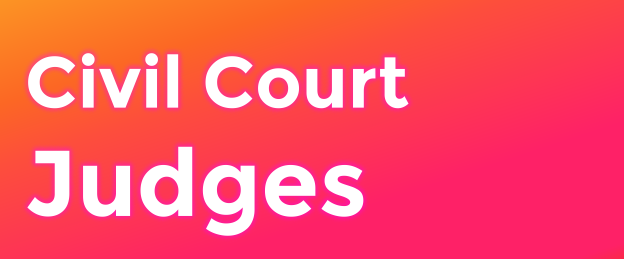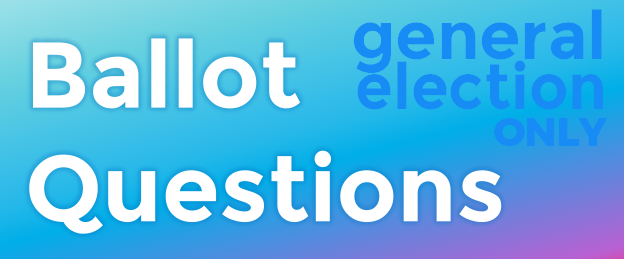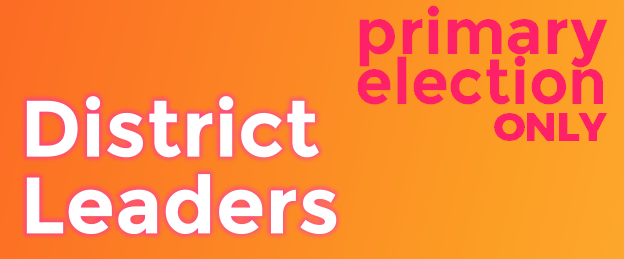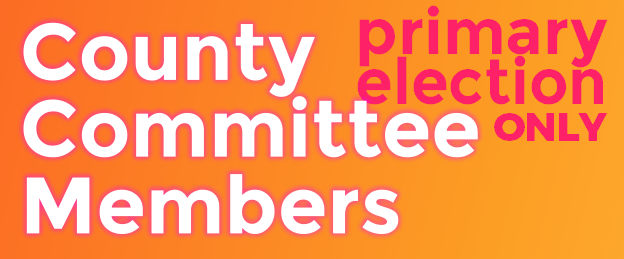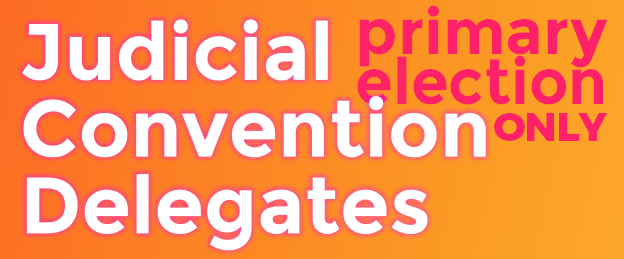
Ballot Questions
Sometimes when we go to vote at the general election, we'll find questions on the NYC ballot
Ballot questions, or referenda, are on the ballot when the state or the city pose certain questions to voters, and we have a chance to weigh in on laws directly, outside the bounds of representational government.
There are 3 questions on the ballot at this year's general election, on November 7, 2017
Visit our pages for each ballot question to learn about the issues, and figure out how to cast your vote!
How do we get Ballot Questions anyway?
There are a few kinds of ballot questions, and we'll take you through them!
It's helpful to know the origin of a ballot question to understand what law applies to it, what politicians or political actors are responsible for it, and what would be changed if you vote yes.
Generally speaking, a ballot question is put on the ballot by the state when it has to do with a state constitutional convention, an amendment to the state constitution, or contracting for state debt.
A ballot question is from NYC if it relates to certain matters of the city, usually to the powers of its officials and government bodies.
Some BQs come from NY STATE
NY is required by our state constitution to put a few types of questions to voters at the general election ballot:
1. The Question of whether or not we want to hold a state constitutional convention, to review the state constitution in its totality, and propose amendments that NYS voters would vote upon. The state must put this question on the ballot every 20 years. (NY State Constitution, Article XIX, Section 2)
- 2017 is the 20th year! Since the state constitutional convention question will be on the November 7 ballot (as BQ #1), we're explaining it in more detail here.
- And as election season rolls along, we'll be providing plenty of info about the evolution of the state constitution on this site - so come back soon for more!
2. Any Proposal (or Proposition) to amend the state constitution that comes from the state legislature must be put to a vote by the people (or registered voters) of NYS. (NY State Constitution, Article XIX, Section 1)
click for more details!
- The process for amending the constitution through this combination of legislature and referendum (rather than by constitutional convention) has many steps:
- A member of either house of the NYS state legislature - Senate or Assembly - proposes an amendment to the constitution in her/his house.
- After the legislator's initial proposal, the NYS Attorney General has 20 days to give an opinion about the impact of the potential amendment on the rest of the constitution. (But the proposal can still move forward without the AG opinion).
- For the proposal to move forward, both houses of the legislature need a majority vote to approve its progress (and must publish the vote in their journals). But it's not out of the legislature yet...
- In the next legislative session before a general election (usually, the next year) after that first vote, both houses of the legislature must AGAIN vote on the same proposal - this time, they must publish information about the proposal for 3 months before their second vote (so people have a chance to weigh in), and each needs a majority vote and to publish the vote in its journals again.
- With all of those majority votes, the legislature next has to send the proposal to NYS voters at a general election.
- But, if there's a state constitutional convention and it puts forward a proposal to amend the constitution on the same topic as a legislative proposal, the constitutional convention amendment will get on the ballot and the legislative amendment will not. (NY State Constitution, Article XIX, Section 3)
- If the proposal gets a majority vote of the people, the amendment passes and becomes part of the state constitution in January of the next year after the general election!
- BQ #2: A proposal to strip pensions from public officials who were convicted of felonies.
- BQ #3: A proposal to change the usage of forest preserves.
3. A Proposal for the state to take on debt for a single work or purpose. (NY State Constitution, Article VII, Section 11)
click for more details!
- The NYS constitution requires that in order for the state to enter into a debt contract, it must be:
- written as a law that explicitly states the single work or purpose of the debt,
- then passed by the legislature at least 3 months before a general election (so people have time to reflect on it),
- and then voted on and approved by the majority of voters in a general election.
- After voters approve it:
- if the legislature has not contracted for the debt, the legislature can repeal the law approved by voters, and
- at any time, the legislature can "forbid the contracting of any further debt or liability under such law."
- Some types of debts are exceptions, and do not need to be put to referendum. These are debts the state enters into for the following purposes:
- "in anticipation of the receipt of taxes and revenues, direct or indirect, for the purposes and within the amounts of appropriations theretofore made." (NY State Constitution, Article VII, Section 9)
- "in anticipation of the receipt of the proceeds of the sale of bonds theretofore authorized, for the purpose and within the amounts of the bonds so authorized." (NY State Constitution, Article VII, Section 9)
- "to repel invasion, suppress insurrection, or defend the state in war, or to suppress forest fires." (NY State Constitution, Article VII, Section 10)
- The NYS constitution also lays out parameters for the state legislature to repay debts, which generally do not need to go to the voters via referendum. (NY State Constitution, Article VII, Section 13)
Other BQs come from NY CITY
Sometimes ballot questions, or referenda, come from the city - and the laws governing city referenda come from NY state law.
Just like other cities and localities in the state, NYC is a "municipal corporation" of the state, and the basic parameters of the city's government are set out in the state's Municipal Home Rule Law ("MHRL"). This law gives localities the ability to control some aspects of their government, and sets limits on or rules for other aspects of government. (So, for example, the NYC mayor has to ask the state legislature for control of city schools, or to change speed limits within the city, because the MHRL doesn't give that power to local government - those powers stay with state government unless the state delegates it to the city.)
The state's MHRL controls how NYC referenda are handled, and then city law expands on it and makes it operational (the NYC Charter is the city's foundational law, the NYC Administrative Code builds on it, as do the Rules of the City of NY).
The kinds of ballot questions that come from NYC are:
1. Proposals to change local laws on specific topics related to the powers of city government and its officials. These proposals generally come from the NYC Council, from citizen petitions (more on that below, or from a Charter Revision Commission (a short-term body created by the mayor or council to review and propose amendments to the City Charter - the last one was in 2010).
click to expand the full list of topics requiring a city referendum!
- From the NY State Municipal Home Rule Law Article 3, section 23:
- "[P]rovides a new charter for such city...
- Changes the membership or composition of the legislative body or increases or decreases the number of votes which any member is entitled to cast...
- Changes the veto power of the elective chief executive officer....
- Changes the law of succession to the office of the chief executive officer of a county elected on a county-wide basis or if there be none the chairman of the board of supervisors, the mayor of a city or village or the supervisor of a town...
- Abolishes an elective office, or changes the method of nominating, electing or removing an elective officer, or changes the term of an elective office, or reduces the salary of an elective officer during his term of office...
- Abolishes, transfers or curtails any power of an elective officer...
- Creates a new elective office....
- [C]hanges the boundaries of wards, or other districts, from which members of the county board of supervisors, chosen as such in such city to represent the city, are elected...
- Changes a provision of law relating to public utility franchises...
- [R]educes the salary or compensation of a city officer or employee, increases his hours of employment or changes his working conditions if such salary, compensation, hours or conditions have been fixed by a state statute and approved by the vote of the qualified electors of the city. No provision effecting such reductions, increases or changes contained in any local law or proposed new charter shall become effective unless the definite question with respect to such reductions, increases or changes shall be submitted separately from any provisions not relating to such reductions, increases or changes and approved by the affirmative vote of a majority of the qualified electors voting thereon...
- [C]hanges a provision of law relating to the membership or terms of office of the civil service commission of the city."
- From the NY City Charter and Administrative Code:
- "Abolishes or changes the form or composition of the [NYC] council or increases or decreases the number of votes any member is entitled to cast or reduces the number of districts from which council members shall be elected...
- Changes the veto power of the mayor...
- Changes the law of succession to the mayoralty...
- Abolishes an elective office, or changes the method of nominating, electing or removing an elective officer, or changes the term of an elective officer, or reduces the salary of an elective officer during his or her term of office...
- Abolishes, transfers or curtails any power of an elective officer...
- Creates a new elective office." (NYC Charter, Chapter 2, section 38)
- Changes the Fire Department members' working hours, tours of duty, and aspects of the platoon system, as laid out in section 15-112 (NYC Administrative Code, Title 15, chapter 1, section 15-112)
- Changes the city's policies regarding acquisition of and contracts for energy and utilities(NYC Administrative Code, Title 22, chapter 3, section 22-302)
2. In the city, New Yorkers can also petition to bring a question onto the ballot, if it is a proposal to change the law on certain topics.
click to expand the full list of topics that you can impact by petitioning for a city referendum!
- "Dispenses with a provision of law requiring a public notice or hearing as a condition precedent to official action...
- Changes a provision of law relating to:
- public bidding, purchases or contracts...
- assessments of real property or benefit assessments for local improvements...
- the exercise of the power of condemnation...
- the authorization or issuance of bonds or other obligations, except as provided in section 34.00 of the local finance law in the case of a city...
- auditing of the accounts of the local government...
- the alienation or leasing of real property of the local government...
- [I]ncreases the salary of an elective officer during his term of office...
- Is a local law relating to apportionment adopted pursuant to subparagraph thirteen of paragraph a of subdivision one of section ten of this chapter..."
(NY MHRL Article 3, section 24)

